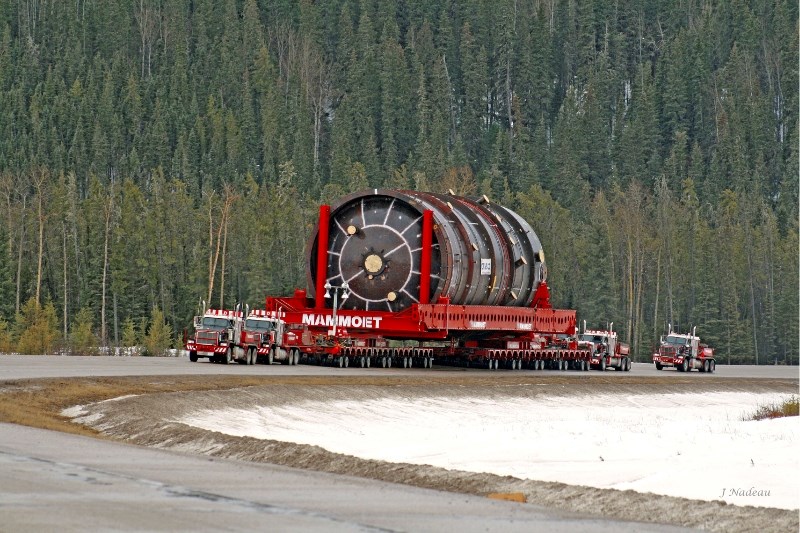Some big things are coming Lac La Biche County’s way – some really, really big things.
Alberta Transportation is working on making Highway 881 – which connects Lac La Biche with Conklin and Fort McMurray – a corridor for wide and heavy loads. That work includes moving or burying power lines that could be in the way of big shipments, and creating turnoffs for the convoys to pull off the road.
That means people who use the two-lane highway could be seeing some monstrously huge shipments headed north to the oil sands. Minister of Transportation and Lac La Biche-St. Paul MLA Ray Danyluk said opening Highway 881 to these big trucks is a way to ensure the oil sands will continue to grow – and that there is alternative route available if there are problems on Highway 63.
“We are a commodity-based economy,” Danyluk said. “We need to get our resources out and our services in. And we need to have a good highway system to do that.”
But just how big will these trucks be?
Doug McCaskill is the transportation director of operations at the Western Canadian Headquarters of Mammoet in Edmonton. Mammoet is a Dutch company that has specialized in moving big things for 130 years. The company is one of several organizations that frequently ships huge pieces of equipment and infrastructure to northeast Alberta via Highway 63 and could soon be using Highway 881 near Lac La Biche as an alternative route.
McCaskill said that shipping a coker – used to break down heavy crude as part of the refining process – means trailers with hundreds of tires and multiple semi-trucks to move it down the highway.
“Something that large isn’t typical,” he said. “I believe it is the largest shipment in Alberta history; there were over 1,000 tires on that shipment alone.”
Thanks to the truck bypass route, these massive shipments wouldn’t be coming through the Hamlet of Lac La Biche. But commuters who use the road would be hitting a rolling speed bump: the convoys max out at 60 km/h.
“As far as vehicles trying to pass these shipments – it will be a challenge,” McCaskill said. “Some of them are 24 feet wide.”
McCaskill said the affect on traffic is minimized by making the shipments in the early morning hours when traffic is lightest, and by using pullouts on the highway to let vehicles pass the convoy.
He added that safety is paramount and that all of their shipments have to be approved by Alberta Transportation. The company also works closely with the RCMP, who escort the convoys through municipalities. In addition to local law, Mammoet has a corporate policy to use up to six pilot vehicles to warn oncoming traffic of the huge shipment headed their way.
“Public safety and involvement is key,” McCaskill said. “We’re hauling some of the biggest commodities on the road.”
There has been no exact timeline presented for when 881 will begin seeing large loads on a regular basis.
The road has recently been in the local news for dangerous driving issues, including speeders clocked by police at upwards of 150 km/h.



